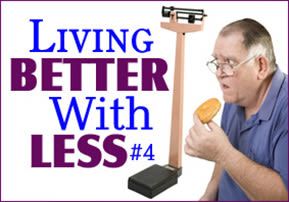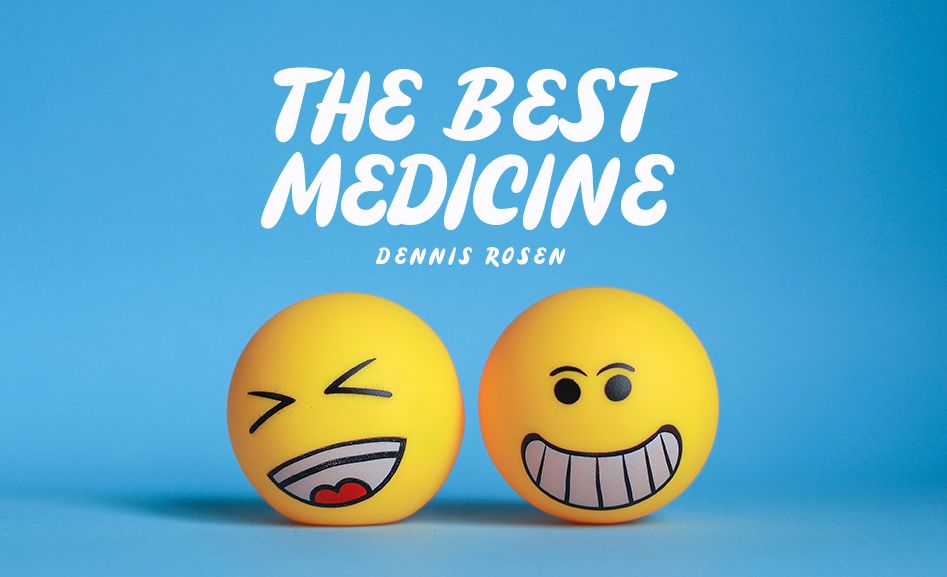
Living Better with Less
Healthy eating has its qualitative side - eating the right foods. Its quantitative side is avoiding gluttony and overeating. We can live better on less food.

Healthy Eating, Part 4
In reality, we can all make do with much less food. Digestion begins with the salivary juices in the mouth. By chewing our food slowly and thoroughly, we both eat less and digest it better. Rebbe Nachman of Breslev warns us not to gulp our food like Esau. Also, we shouldn’t eat on the run and we shouldn’t eat in the street or standing up. Such eating doesn’t have the holiness of sitting at home. Rabbi Shalom Arush told me that when he was a little boy of 4, he once went out in the street with a sandwich. His older brother slapped upside the head, and said, “What are you a goat? Goats roam and eat!” Since then, he won’t touch a thing unless he sits properly at a table. By the way, Rabbi Arush prays before he eats, asking Hashem to help him eat in holiness.
The famed Raivad, Rabbi Avraham ben David, says that eating in holiness has a greater spiritual power than fasting. There’s what’s called “The Raivad’s Fast,” which means eating a morsel of food, chewing it and swallowing it slowly and carefully. Even though the body is screaming for more, you stop, learn a line of Gemara or contemplate Hashem’s Holy Name, and then put another morsel in your mouth. This mode of eating completely breaks the back of lustful eating. It requires tremendous self control and is the total opposite of lustful eating. I’ll tell you a little secret – this is the exact way that the Melitzer Rebbe eats, even on Shabbat when a person is allowed to eat delicacies and greater quantities that he or she would during the week.
The Abridged Code of Jewish Law adopts the Rambam’s directives almost to the letter as religious law. If we open up to Chapter 32, we see that a person is absolutely required by Torah to eat healthy foods and avoid unhealthy foods. If the kashrut-certifying organizations would observe this halacha, then junk food, soft drinks, and a good percentage of processed food would be rendered unfit for consumption.
Let me share with you a few other statutes from the Kitzur Shulchan Aruch, The Abridged Code of Jewish Law:
* The older we get, the less we should eat and the higher quality our food must be.
* In the summer, we should eat no more than 2/3 of what we eat during the winter.
* One should not go to sleep sooner than two hours after eating. This is especially important on Shabbat, when many people take a nap after a heavy cholent (khamin). I prefer to spend an hour in hitbodedut, then learn for an hour, and then go to sleep.
* Any poultry is better than beef and lamb.
Take a look at Chapter 32, and you’ll be glad you did.
You can recognize a true tzaddik by the way he eats. The Zohar says that spiritual impurity has no power over a tzaddik that avoids eating for physical pleasure. The opposite holds true: Those who eat as a result of a lustful appetite and a desire for bodily pleasure succumb to the grasps of spiritual impurity.
A person should take a good hard look at himself. According to everything we’ve learned up until now, his financial problems, social problems, and health problems might all be the result of lustful and unhealthy eating.
The Reishit Chochma gives us 3 guidelines for healthy eating:
1. Make do with a small portion, and don’t ask for more.
2. Eat at a prescribed time, and don’t wait until you’re starving.
3. Don’t eat for the sake of your body, eat for the sake of a healthy soul.
The monumental Chovot HaLevavot, The Duties of the Heart says that we should attain a level whereby needless delicacies and fancy foods that are designed to bring pleasure to the body appear to us as outright forbidden food. People think that healthy food is expensive. Whole grains, fruits and vegetables cost a fraction of what meat, processed foods, junk foods, and restaurant foods cost.
Don’t fool yourself for a minute that a person with an overstuffed belly can be a true tzaddik or Torah scholar. The Torah itself says (Devorim 32:16) that when a person becomes fat from eating delicacies, he revolts against Hashem.
The only way for us to find emuna and to accomplish our task on earth of getting close to Hashem is by steering clear of bodily appetites and amenities, especially food. Our sages told us that we’re best off living on bread and water; they may not have meant in a literal sense, but they sure water telling us to avoid running after fancy food and bodily gratifications. Stop and think how much money you’ll save when you cut out all the unhealthy factory and prepared foods that you buy in the supermarket. I urge you to spend much less time in the frozen foods and beverage isles, and much more time in the fruit and vegetable isles. You’ll feel better and you’ll look better.
Augment your diet with exercise. Even if you don’t cut back on your eating, by walking an hour a day at normal pace, you’ll be able to lose about 3 pounds a month. While you’re walking, talk to Hashem – this is the easiest and most pleasurable way to accomplish 60 minutes of hitbodedut a day.
Rebbe Nachman of Breslev teaches that a person who eats in holiness is the pinnacle of creation, and worthy of The Divine Presence speaking from his throat. Such a person is also guaranteed complete health, too.
Healthy eating therefore has its qualitative side, that we eat the right foods – and its quantitative side, that we avoid gluttony and overeating.
Once we make our dinner tables miniature altars, we’ll surely hasten the day when Mashiach comes and Hashem rebuilds our holy temple, speedily and in our time, amen!











Tell us what you think!
Thank you for your comment!
It will be published after approval by the Editor.